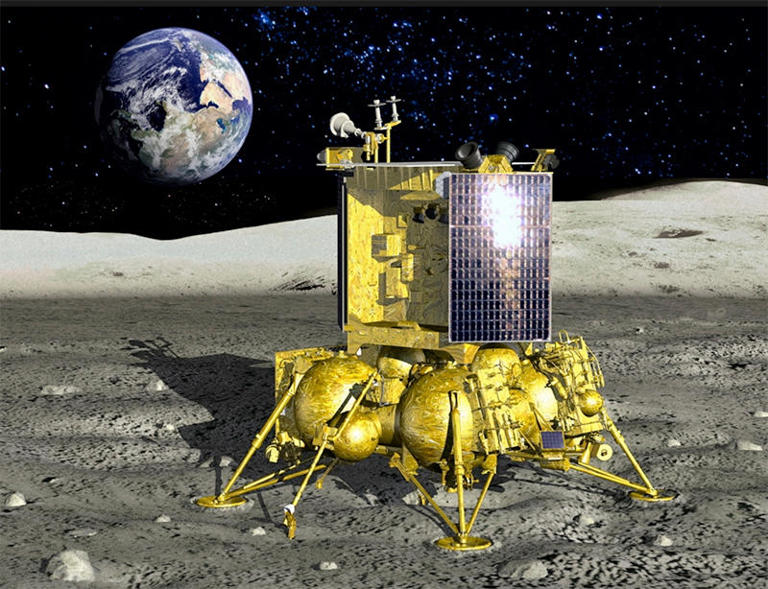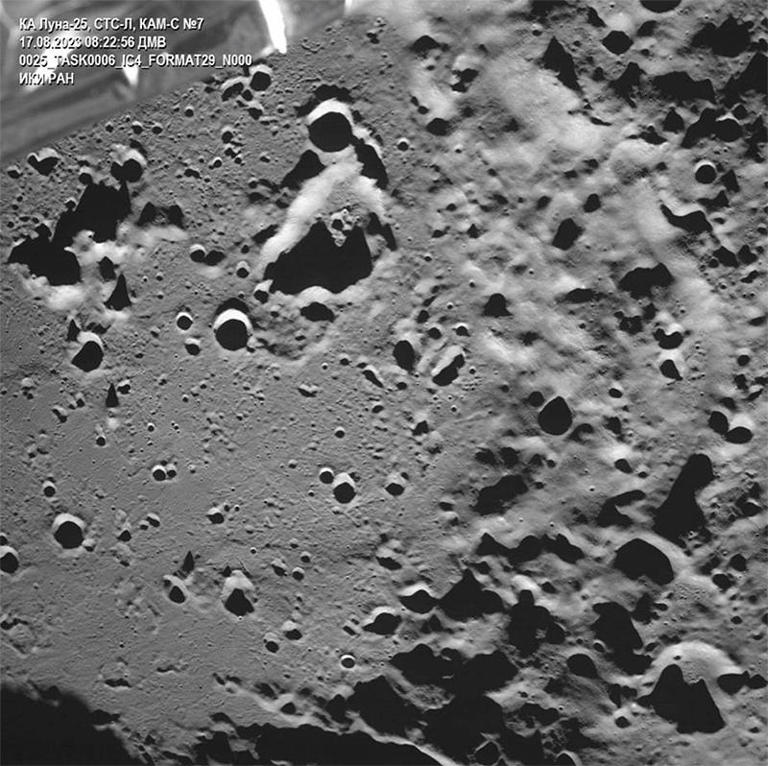Russia's first robotic moon mission in nearly 50 years ends in failure
Story by William Harwood •8h
Russia's Luna-25 probe crashed Saturday on the moon after a thruster firing went awry, cutting off communications and putting the spacecraft in the wrong orbit, the Russian space agency announced Sunday.
The misfire followed problems with an earlier orbit adjustment "burn," but this time around, contact was lost and flight controllers were unable to re-establish communications. Roscosmos, the Russian federal space agency, announced the failure via the Telegram social media platform.
"Due to the deviation of the actual parameters of the impulse (rocket firing) from the calculated ones, the device (spacecraft) switched to an off-design orbit and ceased to exist as a result of a collision with the lunar surface," the Russian-language post said, according to Google Translate.

An artist's impression of Russia's Luna-25 spacecraft on the surface of the moon. The probe crashed into the moon after an orbit-adjustment rocket firing went awry. / Credit: NASA© Provided by CBS News
The failure was a major disappointment for the Russian space program, which was attempting to up its game amid renewed interest in the moon's south polar region where ice deposits may exist in permanently shadowed craters. Ice offers a potential in situ source of air, water and even hydrogen rocket fuel for future astronauts.
NASA's Artemis program plans to send astronauts to the south polar region in the next few years and China is working on plans to launch its own astronauts, or "taikonauts," to the moon's south pole around the end of the decade.
India also has ambitious plans. It's Chandrayaan-3 spacecraft, consisting of a robotic lander named Vikram and a small rover named Pragyan, is in orbit around the moon and on track to touch down on the lunar surface Wednesday. The mission is a follow-up to Chandrayaan-2, which crashed to the moon in 2019 because of a software error.
Luna-25 was launched from the Vostochny Cosmodrome atop a Soyuz 2.1b rocket on August 10. It enter lunar orbit six days later, targeting a landing Monday, beating Chandrayaan-3 to the surface by two days. But it was not to be.

An image of the moon snapped by a camera on the Luna-25 probe after it reached lunar orbit shows off the power clarity of its imaging system. / Credit: Roscosmos© Provided by CBS News
The Russians have had little success with planetary exploration since the Luna-24 robot landed on the moon in 1976, scooped up about six ounces of lunar soil and returned it to Earth. That was Russia's third successful robotic lunar sample return mission.
Twelve NASA astronauts walked on the moon a half century ago in the agency's Apollo program, but no Russian cosmonauts ever made the trip. Russia's only previous post-Soviet deep space robotic missions, both targeting Mars, ended in failure.
Luna-25 was an attempt to pick up the torch, putting Russia back in a new space race of sorts as the United States, China, India, Japan and the private sector are planning multiple moon missions that could lay the foundations for lunar bases and eventual flights to Mars.
The next U.S. flight to the moon is a commercial mission funded by NASA. Intuitive Machines' Nova-C lander could launch atop a SpaceX Falcon 9 rocket late this year. Another commercial lander, Astrobotic's Peregrine, will launch atop a new Vulcan rocket late this year or early next.
The next piloted flight to the moon, Artemis 2, is scheduled for launch late next year, sending four astronauts on a looping trajectory around the moon and back.
The first Artemis moon landing, putting two astronauts on the surface near the lunar south pole, is officially planned for late 2025, but time needed to build and test the SpaceX lunar lander threatens to push the flight into the 2026-27 timeframe.
Story by William Harwood •8h
Russia's Luna-25 probe crashed Saturday on the moon after a thruster firing went awry, cutting off communications and putting the spacecraft in the wrong orbit, the Russian space agency announced Sunday.
The misfire followed problems with an earlier orbit adjustment "burn," but this time around, contact was lost and flight controllers were unable to re-establish communications. Roscosmos, the Russian federal space agency, announced the failure via the Telegram social media platform.
"Due to the deviation of the actual parameters of the impulse (rocket firing) from the calculated ones, the device (spacecraft) switched to an off-design orbit and ceased to exist as a result of a collision with the lunar surface," the Russian-language post said, according to Google Translate.

An artist's impression of Russia's Luna-25 spacecraft on the surface of the moon. The probe crashed into the moon after an orbit-adjustment rocket firing went awry. / Credit: NASA© Provided by CBS News
The failure was a major disappointment for the Russian space program, which was attempting to up its game amid renewed interest in the moon's south polar region where ice deposits may exist in permanently shadowed craters. Ice offers a potential in situ source of air, water and even hydrogen rocket fuel for future astronauts.
NASA's Artemis program plans to send astronauts to the south polar region in the next few years and China is working on plans to launch its own astronauts, or "taikonauts," to the moon's south pole around the end of the decade.
India also has ambitious plans. It's Chandrayaan-3 spacecraft, consisting of a robotic lander named Vikram and a small rover named Pragyan, is in orbit around the moon and on track to touch down on the lunar surface Wednesday. The mission is a follow-up to Chandrayaan-2, which crashed to the moon in 2019 because of a software error.
Luna-25 was launched from the Vostochny Cosmodrome atop a Soyuz 2.1b rocket on August 10. It enter lunar orbit six days later, targeting a landing Monday, beating Chandrayaan-3 to the surface by two days. But it was not to be.

An image of the moon snapped by a camera on the Luna-25 probe after it reached lunar orbit shows off the power clarity of its imaging system. / Credit: Roscosmos© Provided by CBS News
The Russians have had little success with planetary exploration since the Luna-24 robot landed on the moon in 1976, scooped up about six ounces of lunar soil and returned it to Earth. That was Russia's third successful robotic lunar sample return mission.
Twelve NASA astronauts walked on the moon a half century ago in the agency's Apollo program, but no Russian cosmonauts ever made the trip. Russia's only previous post-Soviet deep space robotic missions, both targeting Mars, ended in failure.
Luna-25 was an attempt to pick up the torch, putting Russia back in a new space race of sorts as the United States, China, India, Japan and the private sector are planning multiple moon missions that could lay the foundations for lunar bases and eventual flights to Mars.
The next U.S. flight to the moon is a commercial mission funded by NASA. Intuitive Machines' Nova-C lander could launch atop a SpaceX Falcon 9 rocket late this year. Another commercial lander, Astrobotic's Peregrine, will launch atop a new Vulcan rocket late this year or early next.
The next piloted flight to the moon, Artemis 2, is scheduled for launch late next year, sending four astronauts on a looping trajectory around the moon and back.
The first Artemis moon landing, putting two astronauts on the surface near the lunar south pole, is officially planned for late 2025, but time needed to build and test the SpaceX lunar lander threatens to push the flight into the 2026-27 timeframe.
Namita Singh
Mon, 21 August 2023

A leading physicist and astronomer who served as a key consultant in Vladimir Putin’s moon mission was hospitalised in Moscow after Russia’s first lunar expedition in 47 years failed.
Mikhail Marov, 90, was rushed to hospital following a “sharp deterioration” in his health after Luna-25 spacecraft spun out of control and crashed into the moon.
"It is so sad that it was not possible to land the apparatus," he said after the failure of Luna-25 was announced.
Russia’s state space corporation Roskosmos said it lost contact with the craft at 11.57am (GMT) on Saturday after a problem as the craft was shunted into pre-landing orbit. A soft landing had been planned for Monday.
"The apparatus moved into an unpredictable orbit and ceased to exist as a result of a collision with the surface of the Moon," Roskosmos said in a statement.
It said a special inter-departmental commission had been formed to investigate the reasons behind the loss of the Luna-25 craft, whose mission had raised hopes in Moscow that Russia was returning to the big power moon race.
Mr Marov told the Moskovsky Komsomolets newspaper that he hoped the reasons behind the crash would be discussed and examined rigorously.
"This was perhaps the last hope for me to see a revival of our lunar programme," he said, according to Reuters.
“There was a mistake in the algorithms for launching into near-lunar orbit,’ he was quoted as saying by the Daily Mail. “It must be found.”

A picture taken from the camera of the lunar landing spacecraft Luna-25 during its flight to the moon (Reuters)
“For the specialists who will be involved in the work of the commission, this will not be a big problem. I think the answer will be found in the foreseeable future.”
Sharing details on his medical condition, he told the outlet that he is currently “under observation” as he shared his exasperation over the failure of the mission.
“How can I not worry? This has been very much a matter of my life. It’s all very hard.”
The failure of Luna-25 underscored the decline of Russia’s space power since the glory days of Cold War competition when Moscow was the first to launch a satellite to orbit the Earth – Sputnik 1, in 1957 – and Soviet cosmonaut Yuri Gagarin became the first man to travel into space in 1961.

A Soyuz-2.1b rocket booster with a Fregat upper stage and the lunar landing spacecraft Luna-25 blasts off from a launchpad at the Vostochny Cosmodrome in the far eastern Amur region, Russia (Reuters)
It also comes as Russia’s $2 trillion economy faces its biggest external challenge for decades: the pressure of both Western sanctions and fighting the biggest land war in Europe since World War Two.
Though moon missions are fiendishly difficult, and many US and Soviet attempts have failed, Russia had not attempted a moon mission since Luna-24 in 1976, when Communist leader Leonid Brezhnev ruled the Kremlin.
Russia has been racing against India, whose Chandrayaan-3 spacecraft is scheduled to land on the moon’s south pole this week, and more broadly against China and the United States which both have advanced lunar ambitions.
Russian officials had hoped that the Luna-25 mission would show Russia can compete with the superpowers in space despite its post-Soviet decline and the vast cost of the Ukraine war.
Additional reporting by agencies
No comments:
Post a Comment